The Politics of Revolution
The main speeches and debates from the 1986 Sinn Féin Ard-Fheis including the presidential address of Gerry Adams
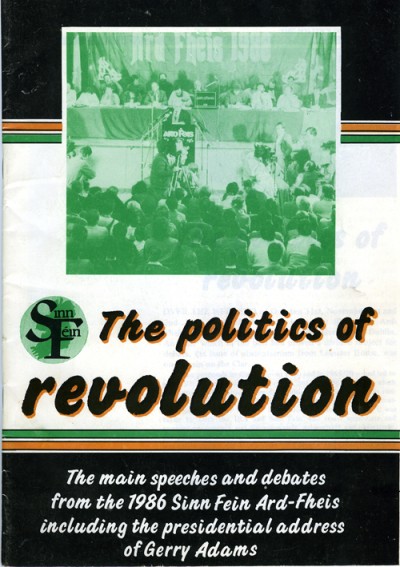
| Date: | 1986 |
|---|---|
| Organisation: | Sinn Féin |
Contributors:
Info | Gerry Adams, Joe Cahill, Pat Doherty, John Joe McGirl, Martin McGuinness, Seán McManus |
| View: | View Document |
| Discuss: | Comments on this document |
| Subjects: |
Please note: The Irish Left Archive is provided as a non-commercial historical resource, open to all, and has reproduced this document as an accessible digital reference. Copyright remains with its original authors. If used on other sites, we would appreciate a link back and reference to The Irish Left Archive, in addition to the original creators. For re-publication, commercial, or other uses, please contact the original owners. If documents provided to The Irish Left Archive have been created for or added to other online archives, please inform us so sources can be credited.
Commentary From The Cedar Lounge Revolution
10th December 2007
Yet again from an anonymous donation to the Archive, this week we have a fascinating historical document. Here is Sinn Féin’s “The Politics of Revolution”, ‘the main speeches and debates from the 1986 Sinn Féin Ard-Fheis’… it ‘includes the presidential address of Gerry Adams’. This Ard-Fheis was arguably the most important of the past two decades and it was the one where abstentionism from Leinster House was finally dropped and the power and authority of the Northern leadership of PSF was fully consolidated. The Ó Brádaigh grouping left the Ard Fheis and never came back (and entertainingly there is actually a photograph or two from the rival meeting convened by Ó B in the West County Hotel - perhaps chosen for their selection of in the main either glum looking or rather elderly activists). From here on in - although it didn’t look like it at the time - the way was clear for a fundamental and frankly staggering change in PSF tactics, if not goals.
So much to say about it but instead of a full analysis - which might be worth doing some other time - I’ll just draw your attention to a number of points. There are a number of interesting omissions. For example, there is no speech from the opposing group centred around Ruáiri Ó Brádaigh (unlike the Workers’ Party’s seminal ‘Patterns of Betrayal’ issued after the WP/DL split which carried a number of pieces from the soon to be DL proponents - which I might put up here as well sometime). There is a clear explication of the rationale for the move in all the pieces. There is a thread of social radicalism. Consider if you will the very open debates on social issues. However - and remember this is a partial sampling and collation of the Ard Fheis with effectively a single purpose - the economic side is so thin as to be transparent. Unionism? Hardly even mentioned. If the game plan was long in terms of repositioning PSF then at this point that box on the agenda had yet to be ticked.
And it is all couched in pragmatism. Republican legitimation of the RSF kind gets short shrift here. Everything is about achieving power. And in that process is it is notable that those who ‘support’ the move are very much of the militarist ilk - at least in terms of the reported speeches. A PIRA statement rubbishes legitimation arguing that ‘to suggest that the IRA is not legitimate because of the decision it has taken on abstentionism is ridiculous. The IRA predates the Second Dail and the First Dail [incidentally, what is it with ‘fada’s’ and these guys? - wbs], it’s constitution, and our legitimacy stems from organised popular resistance to British rule in Ireland, a tradition whcih was reinforced in 1916, by the Fenians, by the Young Irelanders, by the United Irishmen’. And in a final flourish an argument is used which was - no doubt - to come back to haunt them, even if only slightly, in 1997/98… ‘It’s legitimacy stems from a tradition of resistance which has been a fact of history since Britain first encroached Irish sovereignty 800 years ago’. It’s a perfect encapsulation of the twin arguments which would diverge eventually as the peace process grew momentum… on the one hand 32CSM and their outriders would push ‘sovereignty’, on the other the bulk of PSF would argue that the forms of that resistance - whether militarist or political - were less important than its effectivity in achieving goals…
Note the concentration on ‘Revolution’. In fairness to R Ó B (a sentence you will rarely enough find on this site) any ‘revolutionary’ links were very much - if not solely - the fruit of his endeavours in the 1970s and early 1980s as something of an ambassador for Irish Republicanism of the PSF stripe. But. There’s awful little about a revolutionary programme here. Republicanism remains the central ideology, and leftist thinking while apparent (although not entirely clearly explicated) is hardly the key issue. Indeed the binding narrative is one which rests on ‘convictions about sovereignty and resistance [again that duality-wbs] which have sustained republicans through thick and thin, through brutal interrogations, through the pomp of ‘courts and justice’, in desolate prison cells, against the might of the British authorities’…
And Martin McGuinness is quoted as saying: ‘They [the IRA] will not split…’
Could anyone envisage that twenty years later, or so, the same Martin McGuinness who here breathed fire about how PIRA ‘will not walk away from the armed struggle. They are the real revolutionaries. If you allow yourselves to be led out of this hall today, the only place you will be going is home’ would be shoulder to shoulder with Ian Paisley on Wall Street?
Prophetic words though about ‘going home’. And revolutions, as Martin might accept today, come in many different forms.
Apologies for the file size (incidentally if people are having trouble downloading these please tell me and I’ll see if I can scan them in at lower resolutions). It’s about 7.5 mbs…
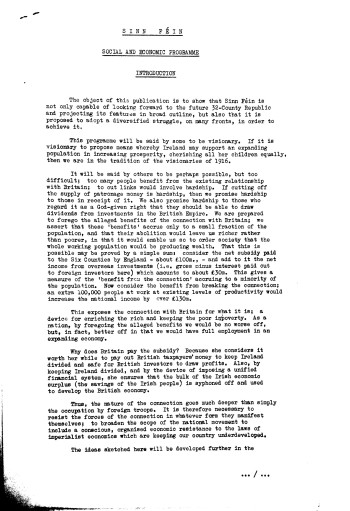
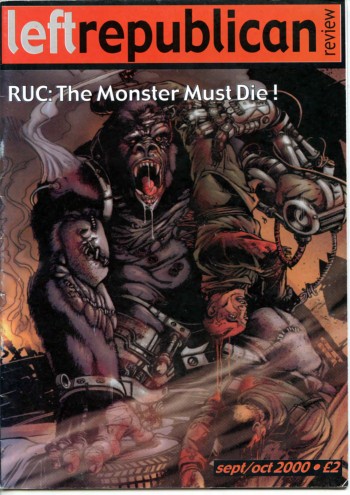
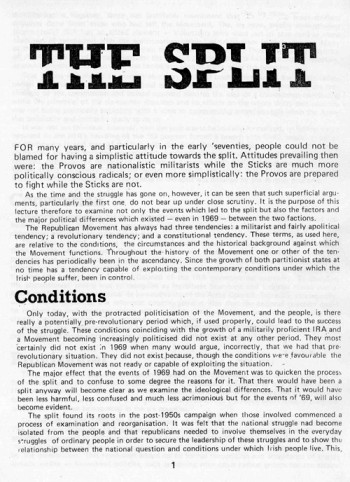
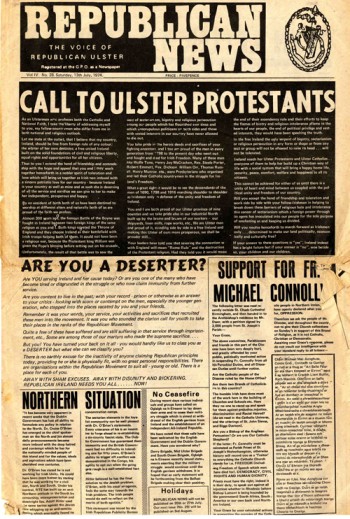
Comments
No Comments yet.
Add a Comment
Comments can be formatted in Markdown format . Use the toolbar to apply the correct syntax to your comment. The basic formats are:
**Bold text**
Bold text
_Italic text_
Italic text
[A link](http://www.example.com)
A link
You can join this discussion on The Cedar Lounge Revolution
By: Garibaldy Mon, 10 Dec 2007 23:27:46
On the AIA, why not just stop at violent loyalist reaction? Why the constant use of the word Catholic if not to appear as the defenders of the Catholic community. Let’s not forget that that is absolutely, totally and utterly the raison d’etre for the Provos, and was central to all their propaganda for decades. Phoenix from the ashes etc. It’s also the role they act out on the ground in NI.
I agree totally that sectarianism made The WP’s position an extremely difficult one. But as I said above, there was a time when it was achieving quite significant support from loyalist areas. Mount Vernon was another one, where Seamus Lynch, in fairness to him, took a caravan to take constituency work when nobody else would. However, and here is an indication of how loyalism had become more aggressive and depoliticised by the early 1990s, the people in the UVF there would simply not have tolerated that to have continued. As for Protestant members, as you say, not huge amounts but some significant ones.
It was the violence and division that limited progressive politics. The divisions remain, but there is a space provided for a new development of progressive politics in NI. It will take more cooperation among progressive foces given the weaker state of the individual organisations, but the ‘tough economic choices’ rhetoric and behviour offers an opportunity, however small initially.
Reply on the CLR
By: WorldbyStorm Tue, 11 Dec 2007 07:42:45
True again. But that’s the narrative they used. It’s not necessarily sectarian given their base – or rather it’s only partially sectarian since they operated in an environment where communal/religious identification retained a greater strength than other identifications. And – to be completely and brutally pragmatic – it’s not as if loyalism or Unionism were going to listen to them in any case. In any case the WP provided an object example of what happens to Republicanism if you go down a certain path. What other party was going to take that route in the North (although the path taken in the South was emulated).
Incidentally, I note you use the term Protestant when I presume you mean Unionist or at least Unionist with a small u, or at least someone from a community? These are the tangles we get caught up in on this subject. I like you find nationalist and catholic inadequate descriptions to get across what I’m trying to say.
But taking your final thesis, if you’re correct and violence was the key to preventing the development of something close to class politics how come we don’t see that now? We’ve had a decade or so of almost no violence yet if anything communalist lines are as embedded as ever, if not as you suggest, more deeply entrenched. That’s what makes me very dubious about the WP (or analogous party/parties0 ever achieving any cross over (quite apart from the fact within its own original community it was very marginalised). The circumstances are objectively better today than ever and yet they’re also obvjectively further away.
Reply on the CLR
By: Garibaldy Tue, 11 Dec 2007 11:05:19
I used Protestant because I had it in my head that was the term you had used but on looking back I see you said unionist background.
Part of the reason there was no development of a more united identity during the last 10 years or so is because the dynamic of politics has remained very much controntational and communalist, at least up until March this year. Parades, prisoners, decommissioning, spy rings, more parades, Northern Bank, Mc Cartney etc all contributed to keeping people at each other’s throats. There’s a theory that says PSF and the DUP have been able to overtake their opponents basically because people trust them to strike as hard a bargain as possible, and that seems to me to be fairly accurate.
I agree entirely that there is more space for class politics but that also it seems further away than ever. I think the difference is not so much just the no violence, but it’s also the fact that local politicians now have some power, and are as we can see just as right wing as everybody else. Ruane has already alienated some of her support base, and Peter and Iris Robinson have been clear where they stand. So we are perhaps seeing the beginning of some fracturing along left/right lines within the communalist blocs, though it will take a long time for that to significantly manifest itself. I also think that had this happened in say the 70s socialists would have been in a much better position to exploit this, whereas now socialism itself is in the eyes of many discredited. Perhaps the most realistic start we can hope for is the expansion of the United Community group.
Reply on the CLR
By: Joe Tue, 11 Dec 2007 13:20:04
“The circumstances are objectively better today than ever and yet they’re also obvjectively further away.”
I can’t see how you can say that they are objectively better today than ever, WBS. After what the North went through from 68 to 2000, it’s inevitable that the two communities will be very much apart and will remain so for a long, long time. People can’t easily forget what was done to them by the other side. In my view, it will be generations before the conditions will be objectively favourable to forging long-term, viable cross community class alliances. All socialists can do is work inch by inch towards hastening the arrival of such conditions.
Surely, conditions were objectively better e.g. during the post-war period when the CP did well in elections or in the early sixties when as Denis Faul said young men in Belfast were more interested in what English football team their peers followed than in what religion they were.
Reply on the CLR
By: Niall Tue, 11 Dec 2007 14:31:28
I haven’t read the post on Provisional Sinn Fein’s 1986 Ard Fheis “The Politics of Revolution” because life is too short (I’ll leave that to the completists), but from perusing the Left Archive it seems apparent to me why Ireland never had a viable left-wing alternative: nearly every left-wing organisation this country produced seems to have been comprised of terrorists or armchair terrorists.
Reply on the CLR
By: soubresauts Tue, 11 Dec 2007 14:44:15
Niall, you really ought to tell us what you mean by “terrorist” and “armchair terrorist”.
Reply on the CLR
By: “This ‘change’ you talk of Captain Kirk… I do not understand it”… or perhaps I do. The Sinn Féin meeting at the weekend. « The Cedar Lounge Revolution Wed, 12 Dec 2007 18:29:07
[…] did stress some degree of equality. And I can’t help turning back to the document posted on Monday in the Left Archive, a document that for obvious reasons did not emphasise the economic, but looked […]
Reply on the CLR